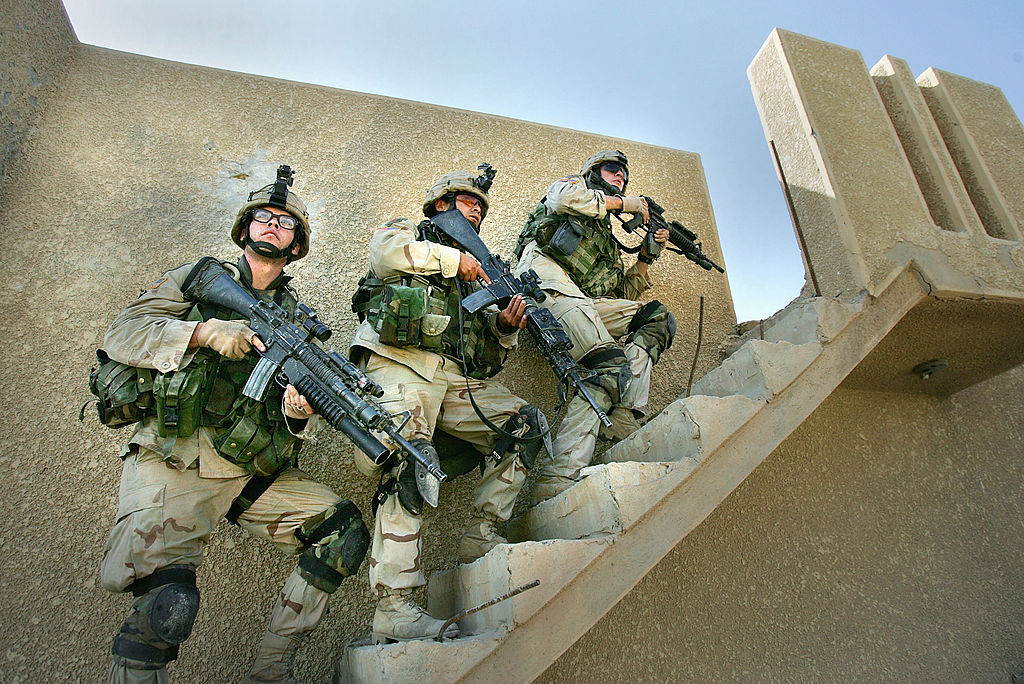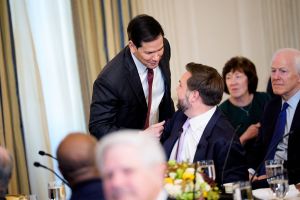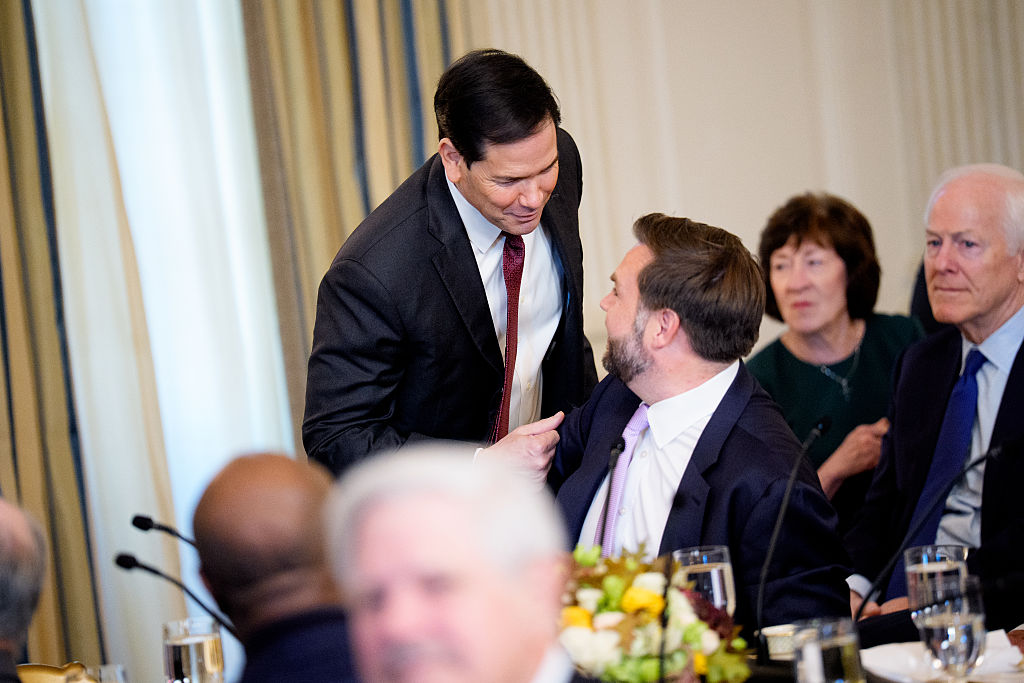The National Museum of the Marine Corps has built a replica of a street in Fallujah, the Iraqi city that American forces half-destroyed in order to save it, in a battle twenty years ago next month. The exhibit promises visitors an “interactive experience that puts them in the boots of a Marine as he kicks down the door of a suspected insurgent stronghold.” If you have a games console, you can play Six Days in Fallujah, a video game where you take the role of a Marine who narrates the action of a firefight that really happened. Fallujah has become a symbol of gritty heroism and sacrifice — or for critics of the Iraq war, occupation and war crimes. Either way, the battle is deeply lodged in the popular imagination. Not since Huế, in 1968, had Americans experienced such intense and prolonged urban combat. Twenty years on, what is the legacy of Fallujah? Was it worth the price paid?
The top brass had decided every fighting unit should have journalists with them — and I was one. Fallujah was known as “the city of mosques” and if one was going to be destroyed, they wanted reporters to see it was being used as a weapons dump or had a sniper in the minaret. I was working for the BBC and embedded with — that is to say, I followed along behind — the First Battalion, Eighth Marine Regiment, the 1/8. If I had to pick a street for the museum to memorialize, it would be the one leading to the Fallujah mayor’s office, which the 1/8 captured on the second day of the battle. The bodies of insurgents were strewn across the road. One lay on his side, as if sleeping, except there was a dog tearing at the flesh on his face.
By the end of the first week of fighting in November, the 1/8 had lost twenty Marines, a fifth of all the Americans killed. Today, Elliot Ackerman wears a metal wristband with the words: “First Lieutenant Daniel T. Malcom, Alpha Company, 1/8, Fallujah, Iraq, KIA 10 November 2004.” This was the fellow officer who died saving him and his men. Elliot has had the wristband since Fallujah and wore it every day until the curved ends broke off and the engraving had to be reset. “I have a number of other dead friends. He was the first, but I wear it for all of them.” I can see Dan Malcom clearly: twenty-five years old, quiet and thoughtful, playing chess against one of his men, the portable chess set he carried everywhere resting on a box of MREs (Meals Ready to Eat). Elliot talks about the rooftop where Malcom died, and I can picture that too.
On the second day of the battle, I followed some of Malcom’s men up onto the flat roof of a five-story building the Marines called the High Rise. The insurgents were firing on them from all sides and they needed to see what was happening. As soon as I got there, I knew I had made a mistake. Everyone was belly down as if trapped under a great weight. There was a sniper in a minaret maybe a hundred yards away. You couldn’t hear the crack of his rifle in the 360-degree roar of battle, but you could almost feel the bullets inches overhead. Occasionally, one skipped off the rooftop, raising a puff of dust. I crawled across the roof and ran the last few yards back through the doorway.
A few minutes later, Malcom came running the other way, onto the roof. A bullet hit his helmet (I was told later) but he kept going, unhurt. In the fog of battle, I thought he was there to get his men back. In fact, he’d had a desperate call from Elliot, who was with his men, spread out over two buildings across the street. They were under artillery fire from their own side: “friendly” fire. As Elliot remembers, shrapnel from the shells made “slapping sounds” against the buildings’ walls. Malcom could stop it if he radioed back to base to “adjust the fire mission.” He made the call and ran back to the doorway. He almost made it, but a bullet caught him just below the flak jacket, under his ribs. He collapsed across the threshold and died where he fell.
Elliot heard later that the chess set was found still in Malcom’s cargo pocket. In 2017, by then a successful novelist, Elliot went back to Fallujah for Esquire magazine. He wanted to stand in the doorway where his friend had fallen. When he got there, the High Rise was gone, not a trace of it left, not a brick. He stood and stared at the empty patch of ground. I ask him about whether his friend’s sacrifice was worth it. It’s meant to be a political question, but he gives a personal answer. “I don’t think that was a waste. He did that for me and the guys in our platoon. I’ve always had total clarity, and real peace, about that.”
The truth is, they all felt “lucky” to be in Fallujah. This was what they had signed up to do. The day after Malcom died, Elliot and his men got surrounded in a small supermarket they called the candy store. He had the most junior officer’s rank possible, second lieutenant, but at the age of twenty-four he was leading a platoon of forty-six men. After twelve hours of siege, twenty-five of the forty-six had been wounded. Elliot got some of the worst casualties to an armored ambulance, under fire the whole time. He kept fighting despite his own shrapnel wounds. He got the Silver Star for that. The candy store features in Six Days in Fallujah, the video game.
“I lost a lot of friends. That troubles me… But we were all volunteers.” It had taken six years from signing his papers to standing in front of a platoon as a Marines infantry officer… a place where his decisions “would really matter,” nowhere more than in Fallujah. “Now, I really understand the nature of the thing I wanted to do. And it’s a hard and terrifying thing. But I can’t regret it. If I was seventeen years old, I would walk right in and become a Marine again.”
In 2004, Thomas Brennan was a nineteen-year-old lance corporal, in a baggy uniform on a skinny frame, like everyone else. His platoon had plenty of injuries after two weeks of fighting but no one KIA (killed in action). That is until the day before Thanksgiving. He tells me it happened as they were walking back to base, beat after a long day of hunting insurgents. They were almost home when they were shot at from a house that was ironically near the base. The Marines called these places “hell-houses.” A twenty-year-old Marine named Bradley Faircloth was among the first through the door. I remember Faircloth well. He was from Alabama, a big, friendly ox of a kid, a linebacker on his high-school football team. Thomas laughs when I say Faircloth was always first in. “He was like that… We all thought we were invincible.”
After two weeks in Fallujah, Faircloth had been wounded twice — so he was already down for two Purple Hearts. My cameraman had filmed him going into another hell-house and catching “frag” from a grenade. He got blasted again this time but did not survive. Something like this was always going to happen to someone in the platoon — it was a miracle they’d got this far — but there was still deep shock. Back at base, Thomas tells me, some guys wept, others just got very quiet; Doc (their medic) was “a wreck”; their sergeant was “furious, yelling and screaming at everybody.” The next day was Thanksgiving: “Sliced turkey over boiled corn or whatever the hell it was and everybody just kind of put on a face.”
That afternoon, some military public affairs officers arrived with a TV crew. They ordered Thomas and others from the platoon to do a live broadcast back to the States — seven hours behind Iraq — for one of the morning shows. “You know, Marines on the frontlines of Fallujah saying Happy Thanksgiving to America. We were all so pissed that we were out there doing that dog and pony show. But every other platoon had lost somebody.”
After leaving the Marines, Thomas founded the War Horse, a nonprofit newsroom that tells stories of war so people can understand “the true cost” of military service. He says, “The generation of people we asked to go fight this battle now have to live with the decision to go to war.” He has “survivor’s guilt” when he thinks about the friends who did not come back. When he thinks about the Iraqis, there’s an “inner conflict”: pride at having done what he was trained to do, regret at what that required.
Thomas thinks about Iraqi kids returning after the battle to find their bedrooms “flipped,” or a family walking into a kitchen smashed to pieces by a rocket. “We blew up buildings we saw as enemy strongholds, but those were schools, those were mosques, those were homes civilians had to come back to later.” In battle, it was too dangerous to stop to take a crap in the street, so they did it in the bathtubs of homes they entered, did it all over the city. “God damn: we did a lot to people that weren’t even involved [in the insurgency]… How many enemies can we create? Because if somebody did that in my neighborhood, I would commit my life to destroying them.”
Even so, like Elliot Ackerman, he is glad he was in Fallujah: “You get to camp as a Marine, and they say, ‘What makes the grass grow?’ And everybody screams ‘Blood! Blood! Blood!’ Marines destroy things. We kill people. That’s what we do. We were sent to do a job. We’re proud that we did our job. I would do it all over again.”
A myth has grown up around Fallujah: that the massive firepower brought down by the Marines caused a massacre of civilians, a war crime. It would be easy to believe that, seeing the ruin the city became. But in November 2004, almost no civilians were there — the most important, and overlooked, fact in the continuing controversy about Fallujah. There were, in fact, two battles. The first was in April 2004, when some 300,000 people were still in the city. They were caught in the crossfire; the whole of Sunni Iraq seemed about to rise up, and the Marines had to withdraw. So they surrounded the city and waited for the civilians to leave.
Ali al-Mashhadani was in Fallujah for the November battle, an Iraqi freelance cameraman, unembedded. Now in his fifties, he remembers how the city was almost empty, with just a few families who had nowhere else to go, or who had sick relatives too unwell to be moved. There were also some “bad spirited” people who stayed behind to loot the empty homes. And the insurgents. After the battle, Ali says, the Sunni political party that controlled Fallujah exaggerated or made up reports of civilians being killed so they could get millions of dollars in compensation. “For the record, and we have to be honest, no atrocities were committed by the Americans. I am a witness to this.”
Ali is no friend of the US military: it jailed him three times, once in Abu Ghraib. He was roughed up, deprived of sleep, zip-tied to a chair for hours and put naked into a freezing cell. American interrogators wanted to know how he could film the insurgents if he wasn’t one himself. The insurgents were equally suspicious: they knew he sold his pictures and stories to “infidel media,” NPR, Reuters and the BBC. One day, an old red Opel drew up and gunmen got out. They handcuffed him, put a bag over his head and threw him in the trunk. “I thought, this is my end. I’m done.” He was put on trial as a spy. He survived by publicly denouncing the Americans and promising to film what the religious court called “the brothers’ operations.”
Ali knew many of the insurgents because he had grown up with them. He tells me that that 80 percent were locals — what they called the Mujahideen — and the rest foreign jihadists, al-Qaeda. The foreigners’ leader, Abu Musab al-Zarqawi, drove around in a convoy of luxury 4x4s with blacked-out windows. People who walked too close to Zarqawi’s headquarters would disappear. This minority attempted to control Fallujah with “extreme violence.” There were beheadings in the street, the corpses put on display with their heads placed on the trunks of the bodies. Children would gather around, laughing and pointing. “It became normal for them.”
The jihadists had money and recruited informants inside government offices to give them lists of who was getting an army or police salary. Ali remembers al-Qaeda beheading seventeen such men in one public execution. No one was allowed to pick up the bodies for days. It was a “message” to those who refused to change sides. The jihadists also had people on US bases to identify “collaborators.” If they couldn’t kill them, they killed their families. Ali says people left their jobs and fled to Syria, Jordan, anywhere. The jihadists created “a whole scene of terror… it was a disaster.”
Sheikh Dhafer al-Obeidi opposed the foreign jihadists; he also opposed the American “occupiers.” In 2004, he was one of the two most senior clerics in the Mujahideen — the “patriotic resistance” — with a black beard and a white cloak with gold fringes. He was also a tribal leader and for a time, in the summer of 2004, was said to be the man in day-to-day charge of Fallujah. Now, he tells me, the Americans are in Iraq as friends, helping to rebuild. “After the US left Japan, Japan was reborn as a strong country. Why can’t Iraq be like Japan?” He even says the US must stay to “finish the mission” and defeat Daesh, the Islamic State, successor to al-Qaeda in Iraq.
Sheikh Dhafer is a cleric in the moderate Sufi tradition of Islam. In 2004, his life was under threat from the foreign jihadists. And today, he says he is again threatened by the same kind of extremism. He tells me there are, in effect, jihadist sleeper cells in Fallujah, even if they are composed of locals, not foreign fighters. He has come face to face with them, “fire and evil in their eyes.” He believes that 15 to 20 percent of the Sunni population support ISIS, not just in Fallujah but across Iraq. “Things might be bad again. We must not to allow things to slide back to the to the way it was. God forbid.”
So could the Marine Corps have to go back to Fallujah? There was a third battle for the city, in 2014, to force out the jihadists, now rebranded as ISIS. It was fought by the Iraqi Army’s Golden Division and Shi’ite militias loyal to Iran. A fourth — or fifth, or sixth — battle of Fallujah would probably fall to the same combination of forces. A couple of thousand American troops, military trainers and advisors, are in Iraq, but they are due to leave. Some American Special Forces will probably remain behind.
Elliot Ackerman calls this a kind of victory. Of the two wars that came after 9/11, Afghanistan was the “good war,” fought for much clearer reasons. “I wouldn’t go as far as to say the US won the war in Iraq, but we didn’t lose it, the way we lost the war in Afghanistan.” He goes on: “It would be easy to throw up your hands and say, ‘Oh, the pity and waste of war,’ and walk away from everything that happened in Iraq…Was the US invasion made on a faulty premise? Absolutely. Was it disastrous? Of course it was.” But they got rid of Saddam and made a democracy, even if a flawed one. “I feel comfortable with the complexity of whether or not it was worth it. I live with that. And I know all the people who fought in Iraq have to live with that complexity.”
This article was originally published in The Spectator’s October 2024 World edition.


























Leave a Reply